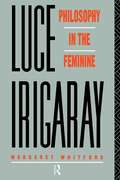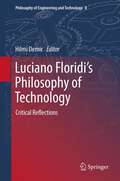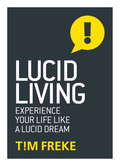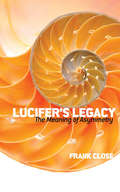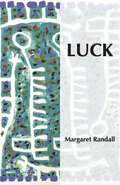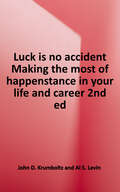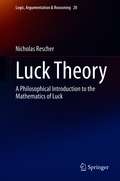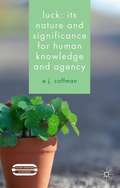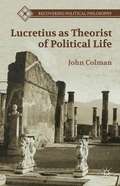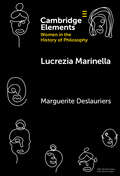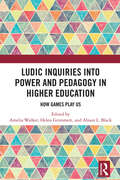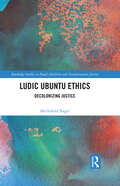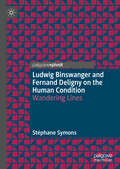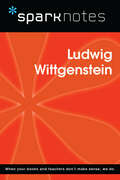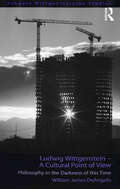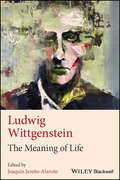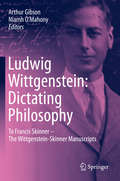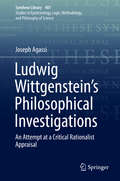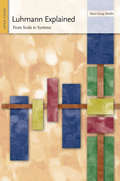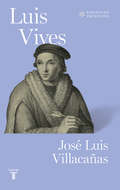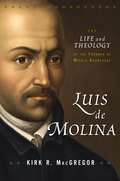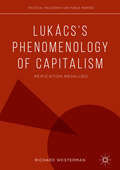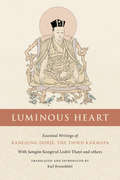- Table View
- List View
Luce Irigaray: Philosophy in the Feminine (Wiley Blackwell Readers Ser.)
by Margaret WhitfordFirst published in 1991. Routledge is an imprint of Taylor & Francis, an informa company.
Luciano Floridi’s Philosophy of Technology
by Hilmi DemirInformation and communication technologies of the 20th century have had a significant impact on our daily lives. They have brought new opportunities as well as new challenges for human development. The Philosopher: Luciano Floridi claims that these new technologies have led to a revolutionary shift in our understanding of humanity's nature and its role in the universe. Florodi's philosophical analysis of new technologies leads to a novel metaphysical framework in which our understanding of the ultimate nature of reality shifts from a materialist one to an informational one. In this world, all entities, be they natural or artificial, are analyzed as informational entities. This book provides critical reflection to this idea, in four different areas: Information Ethics and The Method of Levels of Abstraction The Information Revolution and Alternative Categorizations of Technological Advancements Applications: Education, Internet and Information Science Epistemic and Ontic Aspects of the Philosophy of Information
Lucid Living: Experience Your Life Like a Lucid Dream
by Tim FrekeAfter a life-time studying the world's spiritual traditions, pioneering philosopher Tim Freke presents the mystical heart of spirituality in 8 transformative principles. From his personal experience he describes spiritual awakening as similar to the experience of lucid dreaming - except now while in the waking state. Awakening is lucid living. This astonishingly direct book points to an awakened state. Step by step it guides you through a radically new way of looking at the present moment, so you can experience a spiritual awakening as you are reading. It will take you less than an hour to read, but it could change your life for good. Since it was first published ten years ago Lucid Living has come to be seen by many as a modern spiritual classic. In this new edition Tim Freke reworks adds an 8th principle to account for the profound developments in his own understanding of awakening.
Lucifer's Legacy: The Meaning of Asymmetry
by Frank Close"This is Frank Close's masterpiece -- his best book, and one of the very best introductions to physics for the layperson. Close is a master expositor." -- The (London) Sunday Times"Close's writing is beguiling, mingling personal and historical anecdote with carefully measured doses of exposition in such a way as to guide the reader painlessly into rather deep intellectual waters." -- Nature "Life, intrinsically related to asymmetries, is the theme of this book, and Close offers us an absorbing and scientifically correct account of symmetry and its deep implications." -- CERN CourierThis thought-provoking work by a physicist and popular science writer explores the origins of asymmetry from the molecular level to that of the universe at large. Frank Close takes the readers on a tour of asymmetry that ranges from the development of human embryos to the mysterious Higgs boson, or "God particle," and ongoing research at Switzerland's CERN laboratory.
Luck
by Margaret RandallFearless personal essays from a treasured feminist poet and activistLuck is a collection of essays covering such topics as memory, language, landscape, poetry, anger, sex, food, pandemics, war, violence, feminism, lies, imagination, death, power, identity, and of course luck. Some are full-blown explorations, others brief riffs. Some are prose poetry, others straightforward prose. The author combines scholarly research with personal experience, producing texts both intimate and illuminating. Always attentive to the world around her and the one within, Randall has brought us her most relevant and powerful essays to date.
Luck Is No Accident: Making the Most of Happenstance in Your Life And Career
by John Krumboltz Al LevinUnplanned events—chance occurrences—more often determine life and career choices than all the careful planning we do. A chance meeting, a broken appointment, a spontaneous vacation trip, a "fill-in" job, a hobby these are the kinds of experiences that lead to unexpected life directions and career choices. <p><p>Newly revised and updated with fresh examples and current issues for today's challenging times, Luck is No Accident actively encourages readers to create their own unplanned events, to anticipate changing their plans frequently, to take advantage of chance events when they happen, and to make the most of what life offers. The book has a friendly, easy style about it, and is packed with personal stories that really bring the ideas into focus.
Luck Theory: A Philosophical Introduction to the Mathematics of Luck (Logic, Argumentation & Reasoning #20)
by Nicholas RescherThis book is an original—the first-ever treatment of the mathematics of Luck. Setting out from the principle that luck can be measured by the gap between reasonable expectation and eventual realization, the book develops step-by-step a mathematical theory that accommodates the entire range of our pre-systematic understanding of the way in which luck functions in human affairs. In so moving from explanatory exposition to mathematical treatment, the book provides a clear and accessible account of the way in which luck assessment enters into the calculations of rational decision theory.
Luck: Its Nature and Significance for Human Knowledge and Agency
by E. J. CoffmanAs thinkers in the market for knowledge and agents aspiring to morally responsible action, we are inevitably subject to luck. This book presents a comprehensive new theory of luck in light of a critical appraisal of the literature's leading accounts, then brings this new theory to bear on issues in the theory of knowledge and philosophy of action.
Lucretius
by E. J. KenneyThe De Rerum Natura of Lucretius is a sustained and impassioned protest against religious superstition and irrationality. The poem takes the form of a detailed exposition of Epicurean physical theory - an extreme materialism designed to remove and discredit popular fears of the gods, death and an afterlife. Book III is generally accepted to be the finest in the whole poem; Lucretius argues there that the soul is as mortal as the body and shows that human response to the fact of mortality and death can be at once rational, dignified and liberating. Professor Kenney's commentary is the first to give proper critical emphasis to the techniques and intentions of Lucretius' poetry; it can be read with profit by all students of Latin from senior school level upwards.
Lucretius As Theorist of Political Life
by John ColmanLucretius as Theorist of Political Life is an interpretation of Lucretius' poem On the Nature of Things as a defense of philosophy given the irremediable tension between the competing claims of the philosophic and political life. The central issue is the need for, and attempt by, philosophy to justify and defend its way of life to the political community. This work uncovers how Lucretius' conception of the philosophic life, and the reaction to the human, religious, and political implications of the discovery of nature, distinguish his intention from the anti-theological animus that drives the politically and scientifically ambitious project of his modern appropriators.
Lucrezia Marinella (Elements on Women in the History of Philosophy)
by Marguerite DeslauriersLucrezia Marinella's (1571–1653) most important contributions to philosophy were two polemical treatises: The Nobility and excellence of Women, and the Defects and Vices of Men, and the Exhortations to Women and to Others if They Please. Marinella argues for the superiority of women over men in every respect: psychologically, physiologically, morally, and intellectually. She is particularly effective in using the resources of ancient philosophy to support her various arguments, in which she draws conclusions about the souls and the bodies of women, the nature and significance of women's beauty, the virtue of women and the liberty to which women as well as men are entitled. This Element showcases that her claim of superiority is intended ultimately to justify the possibility of political rule by women.
Ludic Inquiries Into Power and Pedagogy in Higher Education: How Games Play Us
by Alison L. Black Helen Grimmett Amelia WalkerThis book interrogates the role games and playfulness bear in both formal education and informal social learning. Responsive to contemporary social and ecological challenges, this book especially explores games’ interactions with social power. On one hand, games sometimes operate to reinforce ideologies that normalise social injustice and environmental disregard. On the other, games offer rich possibilities for questioning such ideologies and encouraging change.Strongly interdisciplinary, the book assembles 20 chapters written by 50 experts across fields including education, game design, cultural studies, sociology, Indigenous studies, disability studies, queer studies, STEM, legal studies, history, creative writing, visual arts, music, the creative industries, and social inclusion. These contributions not only make games a focus but incorporate playful research writing strategies, demonstrating methods of what we term ludic inquiry. This includes chapters written using arts-based research, practice-led research, poetic inquiry, narrative inquiry, autoethnography, duoethnography, and more. Organised across four themes – ‘philosophical sparks’, ‘lived experiences’, ‘pedagogical perspectives’, and ‘the spirit of play’ – this book emphasises the radical egalitarian possibilities inherent in critical attention to games and how we play (or get played by) them. Its fresh insights will interest all readers interested in creatively remaking our worlds.
Ludic Ubuntu Ethics: Decolonizing Justice (Routledge Studies in Penal Abolition and Transformative Justice)
by Mechthild NagelLudic Ubuntu Ethics develops a positive peace vision, taking a bold look at African and Indigenous justice practices and proposes new relational justice models. ‘Ubuntu’ signifies shared humanity, presenting us a sociocentric perspective of life that is immensely helpful in rethinking the relation of offender and victim. In this book, Nagel introduces a new theoretical liberation model—ludic Ubuntu ethics—to showcase five different justice conceptions through a psychosocial lens, allowing for a contrasting analysis of negative Ubuntu (eg., through shaming and separation) towards positive Ubuntu (eg., mediation, healing circles, and practices that no longer rely on punishment). Providing a novel perspective on penal abolitionism, the volume draws on precolonial (pre-carceral) Indigenous justice perspectives and Black feminism, using discourse analysis and a constructivist approach to justice theory. Nagel also introduces readers to a post secular turn by taking seriously the spiritual dimensions of healing from harm and highlighting the community’s response. Spanning disciplinary boundaries and aimed at readers seeking to understand how to move beyond reintegrative shaming and restorative justice theories, the volume will engage scholars of criminology, philosophy and law, and more specifically penal abolitionism, social ethics, peace studies, African studies, critical legal studies, and human rights. It will also be of great interest to practitioners and activists in restorative justice, mediation, social work, and performance studies.
Ludwig Binswanger and Fernand Deligny on the Human Condition: Wandering Lines
by Stéphane SymonsPhilosophical thinking allows itself to be nourished by seemingly non-committal exercises of thought but at the same time seeks forms of irrefutable knowledge. Because of this focus on both the subjective and the universal, philosophy also falls for the lure of the “what-if?” question. What if two legendary artists, writers or philosophers, who did not know each other, did enter into a conversation? In this book, Stéphane Symons outlines an (im)possible conversation between Swiss psychiatrist and philosopher Ludwig Binswanger (1881-1966) and French educator, philosopher, poet and filmmaker Fernand Deligny (1913-1996). Although the two never met, this imaginary conversation can offer insight into both authors' thinking and the human condition. According to Binswanger, self-awareness and social consciousness are the most important and characteristic features of human beings. In contrast, from his contacts with children and adolescents with autism, Deligny emphasizes our ability to interact with the material environment, especially with seemingly insignificant things and nature. Bringing the two thinkers into conversation, Symons sheds new light on what it is to be truly human. In the process, leading roles are played by one of Binswanger's patients, Ellen West, and a young boy with autism, Janmari.
Ludwig Wittgenstein (SparkNotes Philosophy Guide)
by SparkNotesLudwig Wittgenstein (SparkNotes Philosophy Guide) Making the reading experience fun! SparkNotes Philosophy Guides are one-stop guides to the great works of philosophy–masterpieces that stand at the foundations of Western thought. Inside each Philosophy Guide you&’ll find insightful overviews of great philosophical works of the Western world.
Ludwig Wittgenstein - A Cultural Point of View: Philosophy in the Darkness of this Time (Ashgate Wittgensteinian Studies)
by William J. DeAngelisIn the preface to his Philosophical Investigations Ludwig Wittgenstein expresses pessimism about the culture of his time and doubts as to whether his ideas would be understood in such a time: 'I make them public with doubtful feelings. It is not impossible that it should fall to the lot of this work, in its poverty and in the darkness of this time, to bring light into one brain or another - but, of course, it is not likely'. In this book William James DeAngelis develops a deeper understanding of Wittgenstein's remark and argues that it is an expression of a significant cultural component in Wittgenstein's later thought which, while latent, is very much intended. DeAngelis focuses on the fascinating connection between Wittgenstein and Oswald Spengler and in particular the acknowledged influence of Spengler's Decline of the West. His book shows in meticulous detail how Spengler's dark conception of an ongoing cultural decline resonated deeply for Wittgenstein and influenced his later work. In so doing, the work takes into account discussions of these matters by major commentators such as Malcolm, Von Wright, Cavell, Winch, and Clack among others. A noteworthy feature of this book is its attempt to link Wittgenstein's cultural concerns with his views on religion and religious language. DeAngelis offers a fresh and original interpretation of the latter.
Ludwig Wittgenstein: The Meaning of Life
by Joaquín Jareño‐AlarcónOffers new insights into how Ludwig Wittgenstein understood matters concerning the meaning of life. Widely considered one of the greatest philosophers of the twentieth century, Ludwig Wittgenstein was deeply interested in the significance of religion and ethics. Although he did not systematically examine religion and the meaning of life in his major published works, Wittgenstein professed that he would at times explore fundamental issues from a religious perspective. Ludwig Wittgenstein: The Meaning of Life is the first compilation of private letters, remarks, and notes regarding Wittgenstein's thoughts and attitudes on ethics, religion, goodness, value, and moral action. With an academic approach, author Joaquín Jareño Alarcón reveals the significance of religion and ethics in Wittgenstein’s personal experience, corroborates the permanent tension between Wittgenstein and religion, highlights Wittgenstein’s preoccupation with the basic questions addressed by religious discourse, and more. Chronologically organized texts are accompanied by detailed commentary to illustrate how Wittgenstein’s interests in religion and ethics were reflected throughout his personal and intellectual evolution. Articulates Wittgenstein’s ethical point of view on religion Features a wide range of primary sources, such as personal commentaries, annotations, lecture notes, and diary entries Includes testimony of friends, students, and others with close ties to Wittgenstein Presents a balanced view of what Wittgenstein wrote and the recollections of others in his circle Discusses how the principal intention of Tractatus is to demonstrate the relevance of matters concerning religion and the meaning of lifeLudwig Wittgenstein: The Meaning of Life is essential reading for postgraduate and senior researchers, as well as advanced philosophy students and non-specialists interested in Wittgenstein’s more humanistic writings and his engagement with religion and ethics.
Ludwig Wittgenstein: To Francis Skinner – The Wittgenstein-Skinner Manuscripts
by Ludwig Wittgenstein Francis SkinnerIn this volume we witness Wittgenstein in the act of composing and experimenting with his new visions in philosophy. The book includes key explanations of the origin and background of these previously unknown manuscripts. It investigates how Wittgenstein’s philosophical thought-processes are revealed in his dictation to, as well as his editing and revision with Francis Skinner, in the latter’s role of amanuensis. The book displays a considerable wealth and variety of Wittgenstein’s fundamental experiments in philosophy across a wide array of subjects that include the mind, pure and applied mathematics, metaphysics, the identities of ordinary and creative language, as well as intractable problems in logic and life. He also periodically engages with the work of Newton, Fermat, Russell and others. The book shows Wittgenstein strongly battling against the limits of understanding and the bewitchment of institutional and linguistic customs. The reader is drawn in by Wittgenstein as he urges us to join him in his struggles to equip us with skills, so that we can embark on devising new pathways beyond confusion. This collection of manuscripts was posted off by Wittgenstein to be considered for publication during World War 2, in October 1941. None of it was published and it remained hidden for over two generations. Upon its rediscovery, Professor Gibson was invited to research, prepare and edit the Archive to appear as this book, encouraged by Trinity College Cambridge and The Mathematical Association. Niamh O’Mahony joined him in co-editing and bringing this book to publication.
Ludwig Wittgenstein’s Philosophical Investigations: An Attempt at a Critical Rationalist Appraisal (Synthese Library #401)
by Joseph AgassiThis book collects 13 papers that explore Wittgenstein's philosophy throughout the different stages of his career. The author writes from the viewpoint of critical rationalism. The tone of his analysis is friendly and appreciative yet critical. Of these papers, seven are on the background to the philosophy of Wittgenstein. Five papers examine different aspects of it: one on the philosophy of young Wittgenstein, one on his transitional period, and the final three on the philosophy of mature Wittgenstein, chiefly his Philosophical Investigations. The last of these papers, which serves as the concluding chapter, concerns the analytical school of philosophy that grew chiefly under its influence. Wittgenstein’s posthumous Philosophical Investigations ignores formal languages while retaining the view of metaphysics as meaningless -- declaring that all languages are metaphysics-free. It was very popular in the middle of the twentieth century. Now it is passé. Wittgenstein had hoped to dissolve all philosophical disputes, yet he generated a new kind of dispute. His claim to have improved the philosophy of life is awkward just because he prevented philosophical discussion from the ability to achieve that: he cut the branch on which he was sitting. This, according to the author, is the most serious critique of Wittgenstein.
Luhmann Explained
by Hans-Georg MoellerWhat are systems? What is society? What happens to human beings in a hypermodern world? This book is an introduction to Niklas Luhmann's social system theory which explains specific functions like economy and mass media from a cybernetic perspective. Integrating various schools of thought including sociology, philosophy and biology Luhmann Explained results in an overall analysis of "world society". Special attention is given to the present-day relevance of Luhmann's theory with respect to globalization, electronic mass media, ethics, and new forms of protest.
Luis Vives
by Jose Luis VillacañasEl retrato de nuestro primer filósofo moderno. Ortega y Gasset, quizá distanciándose de su maestro Bonilla y San Martín, autor de una aparatosa biografía de Luis Vives, sentenció con su rotundidad característica que la vida del filósofo valentino se reducía a nacer, estudiar, escribir y morir. Sin embargo, Vives oculta una historia apasionante. Ni la pretenciosa biografía de Bonilla ni la minimalista descripción de Ortega dicen la verdad de Vives. Con el paso del tiempo, y dejando atrás las increíbles manipulaciones de la época de Franco, un grupo importante e internacional de estudiosos ha multiplicado el conocimiento sobre nuestro primer filósofo moderno. Recogiendo todo ese saber, esta biografía ordena la existencia de Vives como ejemplo de un tipo humano excepcional, que supo ver la constelación inaugural de la modernidad, en toda su problemática complejidad, con los ojos de un sefardita valenciano, perotambién con la mente de un humanista europeo. De este modo supo mantener con firmeza su intenso sentido de la filiación, de la concordia y la fidelidad a la patria, pero sin entregar su espíritu crítico y reformador. ------- La colección Españoles Eminentes la forman una serie de biografías de destacadas personalidades españolas que por su excelencia moral o humanística destacaron en su época y siguen teniendo vigencia en la conciencia colectiva. Con ella se pretende analizar la historia de la cultura española a la luz de la ejemplaridad de determinados nombres que carecen todavía de una biografía verdaderamente moderna. El propósito es hacer una aportación real a este género y contribuir al conocimiento de nuestra historia a la vez que se traza la trayectoria de fi guras que por sus méritos sobresalientes y su general reconocimiento pueden ejercer una infl uencia vertebradora en la sociedad actual.
Luis de Molina: The Life and Theology of the Founder of Middle Knowledge
by Kirk R. MacgregorWhen Luis de Molina died in Madrid in 1600, he had every reason to believe he was about to be anathametized by Pope Clement VIII. The Protestant Reformation was splitting Europe, tribunals of the Inquisition met regularly in a dozen Spanish cities, and the Pope had launched a commission two years earlier to investigate Molina’s writings. Molina was eventually vindicated, though the decision came seven years after his death. In the centuries that followed Molina was relegated to relatively minor status in the history of theology until a renaissance of interest in recent years. His doctrine of God’s “middle knowledge,” in particular, has been appropriated by a number of current philosophers and theologians, with apologist William Lane Craig calling it “one of the most fruitful theological ideas ever conceived.” In Luis de Molina: The Life and Theology of the Founder of Middle Knowledge, author Kirk R. MacGregor outlines the main contours of Molina’s subtle and far-reaching philosophical theology, covering his views on God’s foreknowledge, salvation and predestination, poverty and obedience, and social justice. Drawing on writings of Molina never translated into English, MacGregor also provides insight into the experiences that shaped Molina, recounting the events of a life fully as dramatic as any of the Protestant Reformers. With implications for topics as wide-ranging as biblical inerrancy, creation and evolution, the relationship between Christianity and world religions, the problem of evil, and quantum indeterminacy, Molina’s thought remains as fresh and relevant as ever. Most significantly, perhaps, it continues to offer the possibility of a rapprochement between Calvinism and Arminianism, a view of salvation that fully upholds both God’s predestination and human free will. As the first full-length work ever published on Molina, Kirk MacGregor’s Luis de Molina provides an accessible and insightful introduction for scholars, students, and armchair theologians alike.
Lukács After Communism: Interviews with Contemporary Intellectuals
by Eva L. CorredorSince the collapse of communism in Eastern Europe, the validity of Marxism and Marxist theory has undergone intense scrutiny both within and outside the academy. In Lukács After Communism, Eva L. Corredor conducts ten lively and engaging interviews with a diverse group of international scholars to address the continued relevance of György Lukács's theories to the post-communist era. Corredor challenges these theoreticians, who each have been influenced by the man once considered the foremost theoretician of Marxist aesthetics, to reconsider the Lukácsean legacy and to speculate on Marxist theory's prospects in the coming decades. The scholars featured in this collection--Etienne Balibar, Peter Bürger, Terry Eagleton, Fredric Jameson, Jacques Leenhardt, Michael Löwy, Roberto Schwarz, George Steiner, Susan Suleiman, and Cornel West--discuss a broad array of literary and political topics and present provocative views on gender, race, and economic relations. Corredor's introduction provides a biographical synopsis of Lukács and discusses a number of his most important theoretical concepts. Maintaining the ongoing vitality of Lukács's work, these interviews yield insights into Lukács as a philosopher and theorist, while offering anecdotes that capture him in his role as a teacher-mentor.
Lukács’s Phenomenology of Capitalism: Reification Revalued (Political Philosophy and Public Purpose)
by Richard WestermanThis book offers a radical new interpretation of Georg Lukács’s History and Class Consciousness, showing for the first time how the philosophical framework for his analysis of society was laid in the drafts of a philosophy of art that he planned but never completed before he converted to Marxism. Reading Lukács’s work through the so-called “Heidelberg Aesthetics” reveals for the first time a range of unsuspected influences on his thought, such as Edmund Husserl, Emil Lask, and Alois Riegl; it also offers a theory of subjectivity within social relations that avoids many of the problems of earlier readings of his text. At a time when Lukács’s reputation is once more on the rise, this bold new reading helps revitalize his thought in ways that help it speak to contemporary concerns.
Luminous Heart: Essential Writings of Rangjung Dorje, the Third Karmapa
by Rangjung Dorje Jamgön Kongtrul TayéAn extraordinary collection of writings on buddha nature by the Third Karmapa Rangjung Dorje (1284-1339)--now in paperback.The Third Karmapa Rangjung Dorje's unique and balanced view synthesizes Yogācāra Madhyamaka and the classical teachings on buddha nature. His work focuses on the transition from ordinary deluded consciousness to enlightened wisdom, the characteristics of buddhahood, and a buddha's enlightened activity. Included are commentaries by Jamgön Kongtrul Lodrö Tayé that supplement the view of the Third Karmapa on two fundamental treatises on buddha nature, emphasizing the luminous empty mind of buddha nature as presented by the great Indian masters Maitreya and Asaṅga. For those practicing the sutrayāna and the vajrayāna in the Kagyü tradition, what these texts describe can be transformed into living experience.
